1970 Chemtoy Superball #134 Phil Niekro (Braves)
| Grade |
EX/MINT to NM/MINT |
| Book Value |
n/a |
| Our Price |
$ 11.95
Add to cart
|
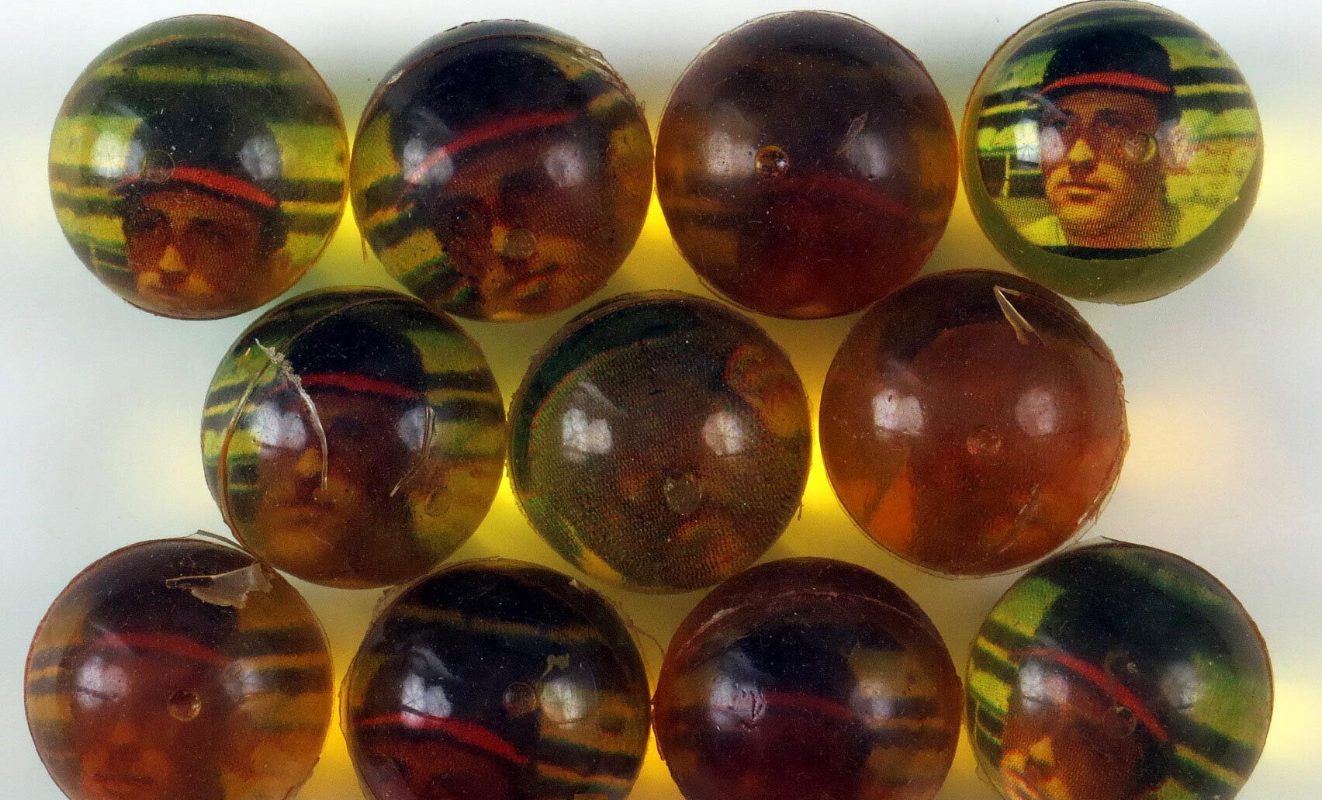

Below are short bits & pieces on sportscard & baseball trading card collecting.
Please wander around the website for more info, prices, values & images
on vintage baseball, football, basketball, hockey, sport and non-sports cards.
1960 Leaf Baseball Cards
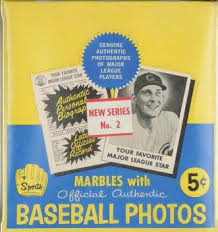
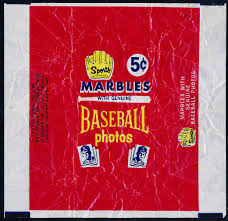
The 1960 Leaf baseball card set featured 144 regular-sized high-gloss
photo quality cards. Back then Topps had a monopoly on baseball cards
packaged with gum or candy so Leaf packaged their cards with marbles.
The marbles were from Sports Novelties Inc. and the cards, called
1960 Leaf, bear copyrights by Sports Novelties Inc.
Hall of Famers Luis Aparicio, Orlando Cepeda and Jim Bunning were the
top stars in the set. The set came in two series, with the second
series high numbers (#73-#144) produced in very limited quantities.
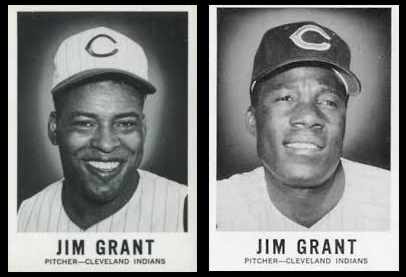
Scarcest card in the set is the corrected version of Jim
'Mudcat' Grant (#25). The more common error variation pictured
Brooks Lawrence on the front with Jim Grant's info on back.
To promote this set, Leaf also produced (8) very scarce Big-Head
PROOF variations.
There were also (3) different variations of the back of Hal Smith's
card #58. Leaf also produced (8) very scarce and extremely expensive,
Big-Head PROOF variations to promote their set.
Click for complete
1960 Leaf Baseball Cards
Note: You may be on that page right now.
|

1954 Topps Scoops
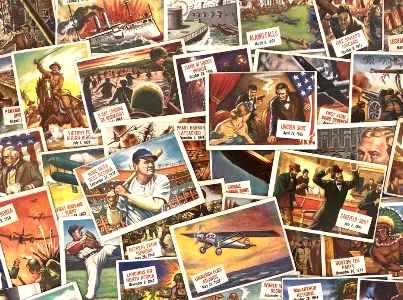
1954 Topps Scoops squeezes 1,000 years of history into a sharp (156) card set.
The cards, slightly smaller 2-1/16" x 2-15/16", were released in (2)
(78) card series. Each card had a colorful painting and caption
with date on front. Some were issued with a scratch-off area meant
hiding the headline so some cards are found with and without the
coating.
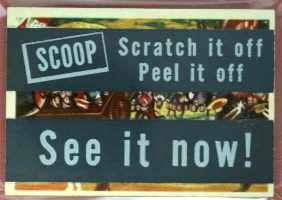
1954 Scoops covered many major events & people throughout history.
Mostly a non-sports set, many top sports stars like Babe Ruth,
Jesse Owens, Notre Dame's Four Horsemen, Joe Louis, Bob Feller
and Ben Hogan were included.
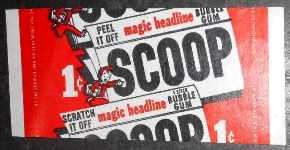
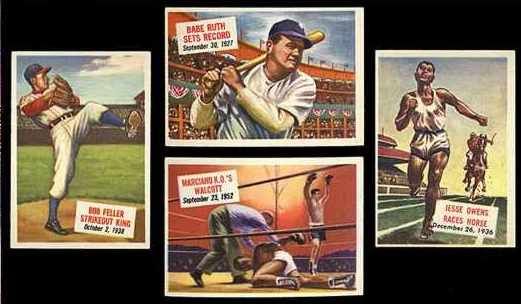
Backs are similar to a newspaper's front page with newspaper's name,
headline, date & location at top. The set seemed to focus on
disasters like the San Francisco Earthquake, Fire Sweeps Chicago,
Rome Burned, Pompeii Destroyed (#91); and wars: Battleship Maine
Blown Up, Alamo Falls, U.S. Troops Reach France, World War II
Begins, Victory in Europe & Napoleon Loses at Waterloo plus many
other events that shaped the world.
Click for complete
1954 Topps Scoops
Note: You may be on that page right now.
|

1979 Topps Baseball Cards
Checklist & Values
Highlights of the 1979 Topps baseball card set are:
* Hall-of-Famer Ozzie Smith's rookie card,
* (2) Bump Wills variations; Rangers and the ERROR Blue Jays,
* Special All-Time Leaders with Babe Ruth, Hank Aaron, Nolan Ryan...
* Packed as (37) or more cards featured Hall-of-Famers !!!
Given all of the above, the 1979 set is very affordable.
TOP ROOKIES were Hall-of-Famers Eddie Murray, Paul Molitor,
Alan Trammell & Jack Morris.
NOTE: Ozzie Smith is by far the most value card in the set.
Unfortuantely, for some reason, it suffered from poor sheet cutting
and most Ozzie rookies are well off center.
Click for complete
1979 Topps Baseball card checklist, values and prices.
Note: You may be on that page right now.
|

How long have sports cards been around ? (part 1)
The first baseball trading cards date back to 1869. For many years,
baseball cards were packaged in packs of tobacco as a way to increase sales
the same way that today prizes are packaged in boxes of cereal.
In the 1920's and 1930's, candy and gum companies started packaging baseball
cards in their products as well.
Baseball card production was virtually halted in the early 1940's due to paper
shortages created by World War II. The "Modern Era" of baseball cards began in
1948 when Bowman Gum Inc. offered one card and one piece of gum in a pack for a penny.
The first important football set was the Mayo set featuring college players
in 1984. Other than the 1935 National Chicle set no other key football set was
issued until 1948 when noth Bowman and Leaf produced sets.






 The 1960 Leaf baseball card set featured 144 regular-sized high-gloss
photo quality cards. Back then Topps had a monopoly on baseball cards
packaged with gum or candy so Leaf packaged their cards with marbles.
The marbles were from Sports Novelties Inc. and the cards, called
1960 Leaf, bear copyrights by Sports Novelties Inc.
The 1960 Leaf baseball card set featured 144 regular-sized high-gloss
photo quality cards. Back then Topps had a monopoly on baseball cards
packaged with gum or candy so Leaf packaged their cards with marbles.
The marbles were from Sports Novelties Inc. and the cards, called
1960 Leaf, bear copyrights by Sports Novelties Inc. 
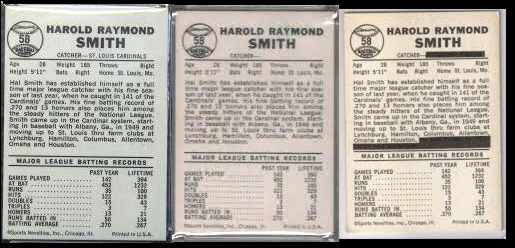
 1954 Topps Scoops squeezes 1,000 years of history into a sharp (156) card set.
The cards, slightly smaller 2-1/16" x 2-15/16", were released in (2)
(78) card series. Each card had a colorful painting and caption
with date on front. Some were issued with a scratch-off area meant
hiding the headline so some cards are found with and without the
coating.
1954 Topps Scoops squeezes 1,000 years of history into a sharp (156) card set.
The cards, slightly smaller 2-1/16" x 2-15/16", were released in (2)
(78) card series. Each card had a colorful painting and caption
with date on front. Some were issued with a scratch-off area meant
hiding the headline so some cards are found with and without the
coating.
 1954 Scoops covered many major events & people throughout history.
Mostly a non-sports set, many top sports stars like Babe Ruth,
Jesse Owens, Notre Dame's Four Horsemen, Joe Louis, Bob Feller
and Ben Hogan were included.
1954 Scoops covered many major events & people throughout history.
Mostly a non-sports set, many top sports stars like Babe Ruth,
Jesse Owens, Notre Dame's Four Horsemen, Joe Louis, Bob Feller
and Ben Hogan were included.

 Backs are similar to a newspaper's front page with newspaper's name,
headline, date & location at top. The set seemed to focus on
disasters like the San Francisco Earthquake, Fire Sweeps Chicago,
Rome Burned, Pompeii Destroyed (#91); and wars: Battleship Maine
Blown Up, Alamo Falls, U.S. Troops Reach France, World War II
Begins, Victory in Europe & Napoleon Loses at Waterloo plus many
other events that shaped the world.
Backs are similar to a newspaper's front page with newspaper's name,
headline, date & location at top. The set seemed to focus on
disasters like the San Francisco Earthquake, Fire Sweeps Chicago,
Rome Burned, Pompeii Destroyed (#91); and wars: Battleship Maine
Blown Up, Alamo Falls, U.S. Troops Reach France, World War II
Begins, Victory in Europe & Napoleon Loses at Waterloo plus many
other events that shaped the world.
